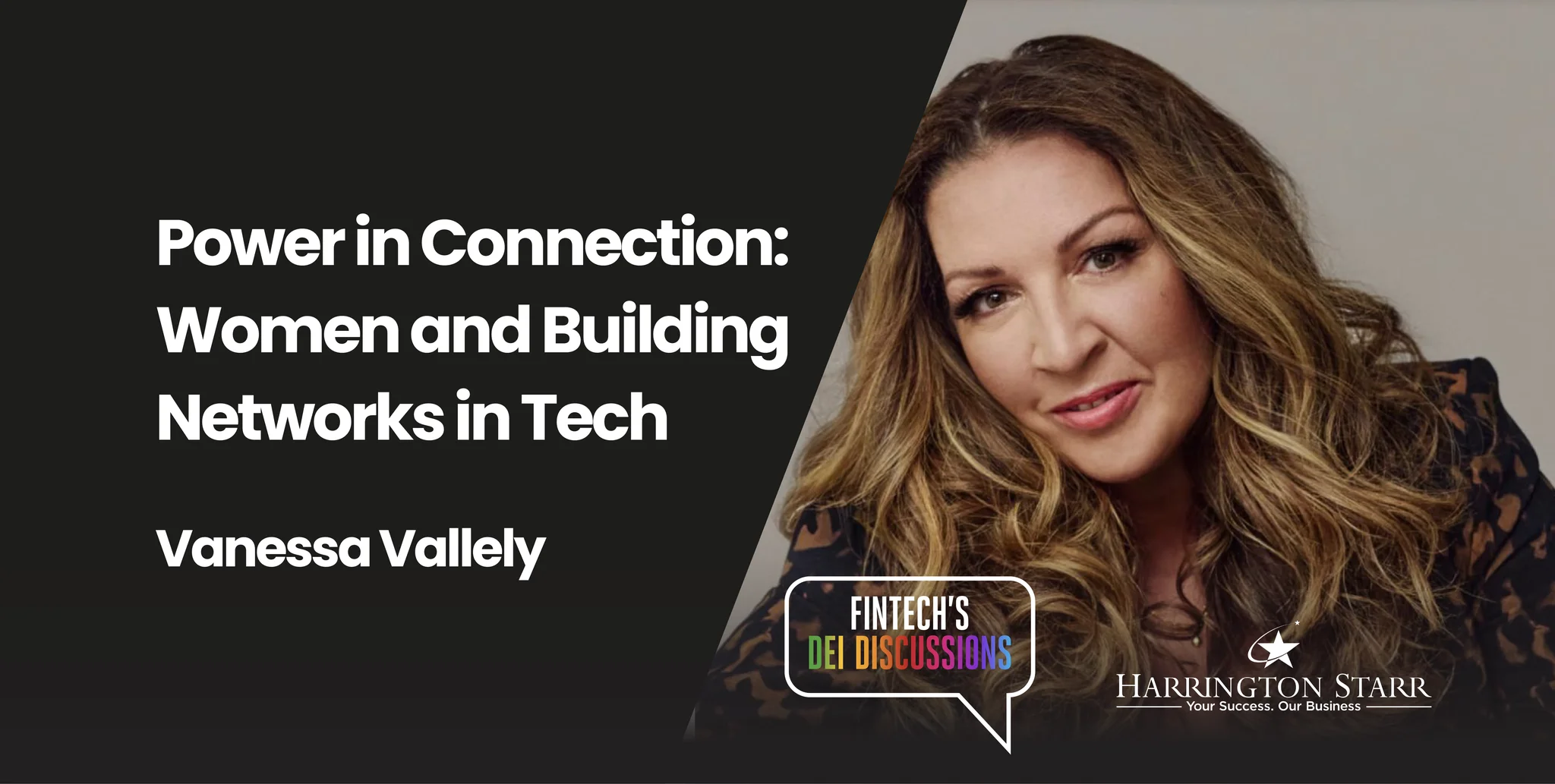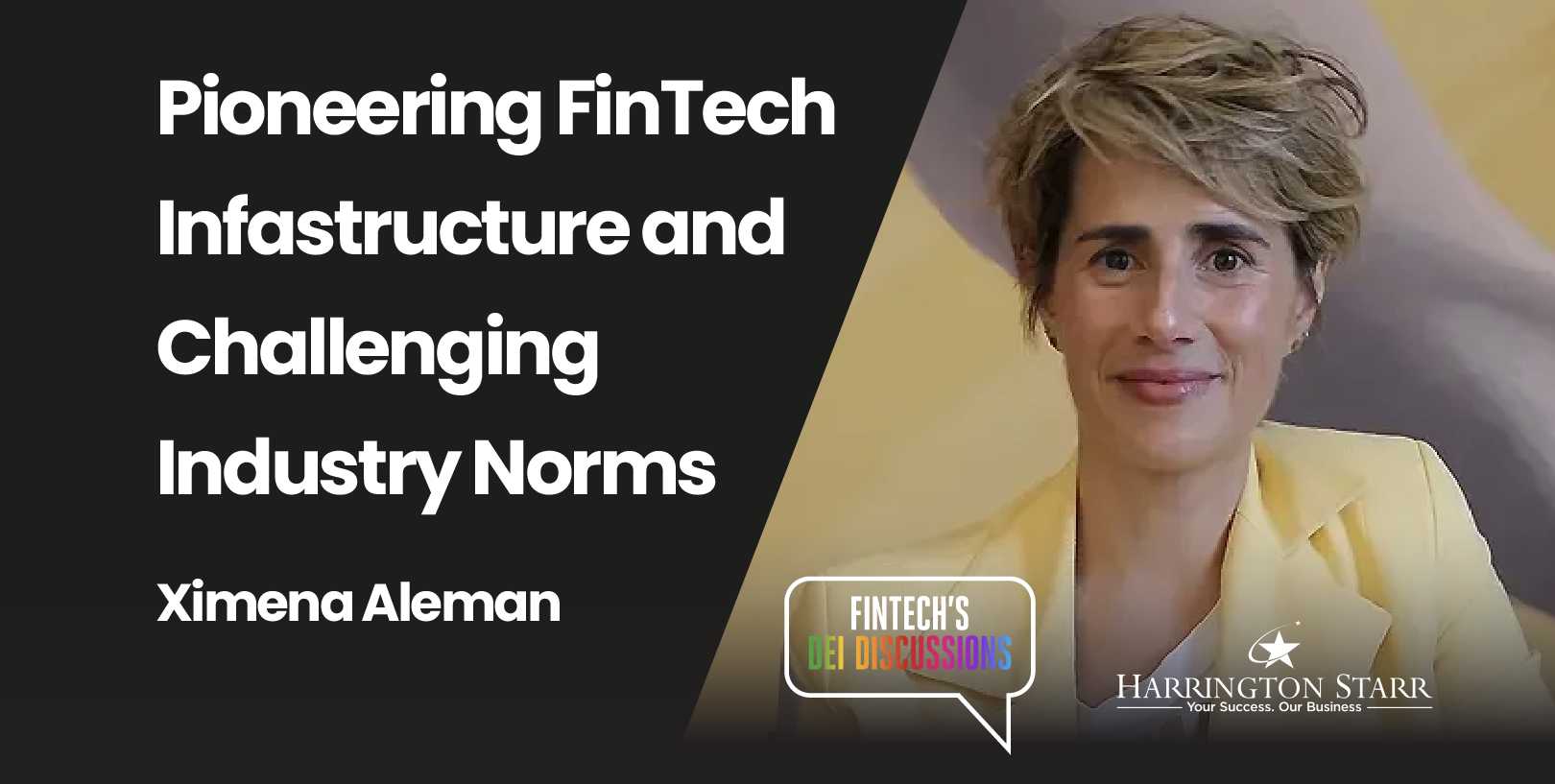
In this episode of the FinTech’s DEI Discussions podcast, hosted by Nadia, Co-Founder and Chief Customer Officer at Harrington Starr, we delve into the fascinating world of FinTech infrastructure and inclusion with Ximena Aleman, the Co-Founder and Co-CEO of Prometeo. Prometeo is a leading FinTech company based in Latin America, specialising in creating FinTech infrastructure that empowers global companies and financial institutions to connect with the Latin American banking system through a single API. Ximena shares her journey as an entrepreneur and provides valuable insights into the challenges and opportunities in the FinTech space, particularly in Latin America.
Ximena’s Journey as a FinTech Entrepreneur
Ximena begins by introducing herself as a Uruguayan founder who has been building FinTech solutions in Latin America for over a decade. “Prometeo is my third startup,” she explains, emphasising her deep experience in the FinTech industry. The focus of Prometeo is on building FinTech infrastructure for B2B companies, helping them connect seamlessly with the banking system in Latin America. “What we are doing is building FinTech infrastructure for B2B companies and trying to help global companies and financial institutions to plug into the banking system in Latin America through a single API,” she says. Prometeo has created the largest open banking network in Latin America, covering over a thousand financial institutions and a thousand APIs.
A Unique Background in Journalism and Marketing
Ximena’s background is unique. Before diving into the FinTech world, she worked in journalism and marketing. “I worked in media outlets for a couple of years, transitioned to marketing, and was head of marketing in the Uruguayan office of a global law firm,” she shares. Her journey also includes pursuing an MBA with a focus on tech businesses, which eventually led her to co-found Prometeo with her two co-founders, Rodrigo and Eduardo. Together, they have been working on building innovative FinTech solutions for over 10 years. On a personal note, Ximena is also a mother of twins, which she humorously describes as “a full-time job by itself.”
The Importance of FinTech Infrastructure
Nadia, acknowledges the challenges Ximena faces in balancing her roles as an entrepreneur and a mother, commending her for the passion and dedication she brings to her work. Ximena then delves into the importance of infrastructure in the FinTech industry, a topic she is deeply passionate about. She explains that infrastructure is not an intuitive concept; rather, it is something that is learned through experience. “Infrastructure is not a very intuitive concept. For us, it didn’t come out of the blue,” Ximena explains. Her experience in her first two startups made it clear that API infrastructure was a significant bottleneck for FinTech disruption in Latin America.
The FinTech Revolution in Latin America
Over the last decade, Ximena has witnessed the FinTech revolution unfold, particularly in Latin America. She highlights the digitisation of lending and payments, the wave of FinTech inclusion led by neobanks, and government policies aimed at financial inclusion. However, she also points out the challenges of delivering proper financial services due to inadequate infrastructure. “When you realise that you cannot deliver proper financial services because you lack the infrastructure, that’s when you notice the infrastructure,” Ximena emphasises. This realisation has driven Prometeo’s mission to build the right foundation for financial services in the future.
Ximena uses a compelling analogy to describe the importance of getting the infrastructure right. She compares it to the roads and bridges built by the Romans 2,000 years ago. “They weren’t thinking about what will happen 2,000 years after that… but they got the infrastructure right,” she says. Ximena believes that, like the Roman roads, getting the FinTech infrastructure right today will enable progress and development in the financial services industry for generations to come.
Prometeo’s Major Achievements and Expansion
One of Prometeo’s most significant achievements is its partnership with two of the largest global megabanks, making it one of only two LATAM FinTechs to achieve this distinction. Ximena attributes this success to understanding customer needs and identifying gaps in the market. She reveals that much of Prometeo’s platform usage is cross-border, with financial institutions outside Latin America trying to connect with the LATAM banking system. “Most of the use of the platform was from financial institutions outside Latin America, trying to plug into the banking system of LATAM,” she says. By creating a middle layer that bridges financial infrastructure across countries, Prometeo has expanded its services beyond Latin America and recently launched a bank account verification solution in the U.S. This expansion marks a significant milestone for Prometeo, as it now covers 11 countries, bridging the Americas and enhancing cross-border financial operations.
The Journey of Developing a key FinTech product
Ximena reflects on the journey of developing Prometeo’s bank account verification product, which has evolved over the past three years. Initially, it was a small use case requested by a customer, but it quickly became apparent that bank account verification was a major pain point for many companies, especially in areas such as anti-money laundering, know-your-customer processes, fraud prevention, and error prevention. With the rise of global regulations like PSD3 in Europe, which mandates payment and bank account verification, Prometeo’s product is well-positioned to meet the growing demand. Ximena is proud that their solution is fully developed and has been successfully deployed in multiple markets, stating, “It’s not that we are MVP anything.”
The Emotional Journey of an Entrepreneur
As the conversation shifts towards Ximena’s personal journey as a founder, she opens up about the challenges she has faced, particularly in fundraising. “Resilience was something that I had to develop for myself, for my own survival,” she candidly shares, highlighting the emotional toll that entrepreneurship can take. Ximena emphasises that being an entrepreneur is not just about intellectual capabilities but also about emotional strength. She speaks about the concept of the “underestimated,” a label she encountered during her fundraising efforts. Coming from a small country like Uruguay and without the typical background of having worked at major companies like JP Morgan or Google, Ximena had to overcome the perception of being underestimated in the global startup ecosystem.
Advice for Aspiring FinTech Founders
Ximena’s advice to aspiring founders is to trust in their emotional skills and resilience. “At the beginning of the journey, the process is not intellectual. The process is emotional,” she says, urging entrepreneurs to trust themselves and embrace the uncertainty of who they will become. She believes that while connecting the dots in one’s entrepreneurial journey is often emphasised, the reality is that it’s a narrative exercise that comes later. The initial stages require a strong sense of self-awareness and the ability to navigate emotional challenges.
The Need for Greater Inclusion in FinTech
The discussion then turns to the broader issue of inclusion in the FinTech industry. Ximena acknowledges that there is no single answer to creating a more inclusive industry, but she stresses the importance of taking action and discussing these challenges openly. She highlights the stark funding gap for women in FinTech: “28 percent of the founders are women, and they get just 1 percent of the funding.” This statistic underscores the need for a shift in how resources are deployed, and which visions of the future are being funded.
Ximena concludes the conversation with a call to action for the FinTech industry to be more thoughtful about the futures it is building and who is shaping those futures. She invites listeners to consider the type of future they want to create and to ensure that funding and resources are allocated to diverse and inclusive visions of that future.
This episode is a must-listen for anyone in the FinTech industry, particularly those interested in the intersection of financial technology, infrastructure, and inclusion. Ximena Aleman’s insights offer a valuable perspective on the challenges and opportunities in building a more inclusive FinTech ecosystem. Tune in to hear how she is leading the charge in Latin America and beyond, and what we can all learn from her journey as a FinTech entrepreneur.





